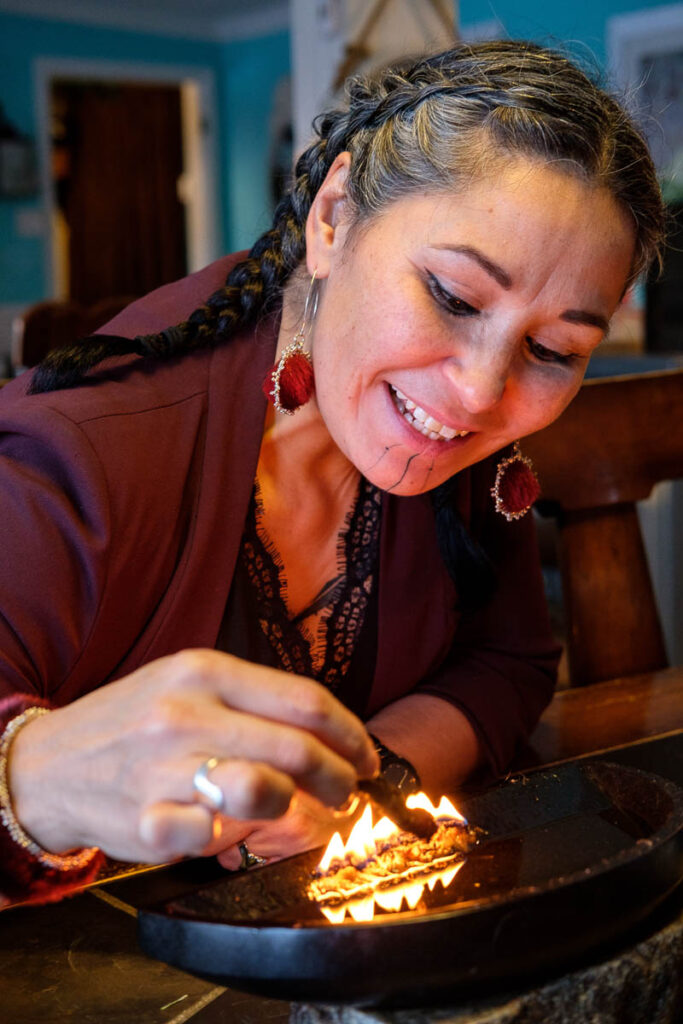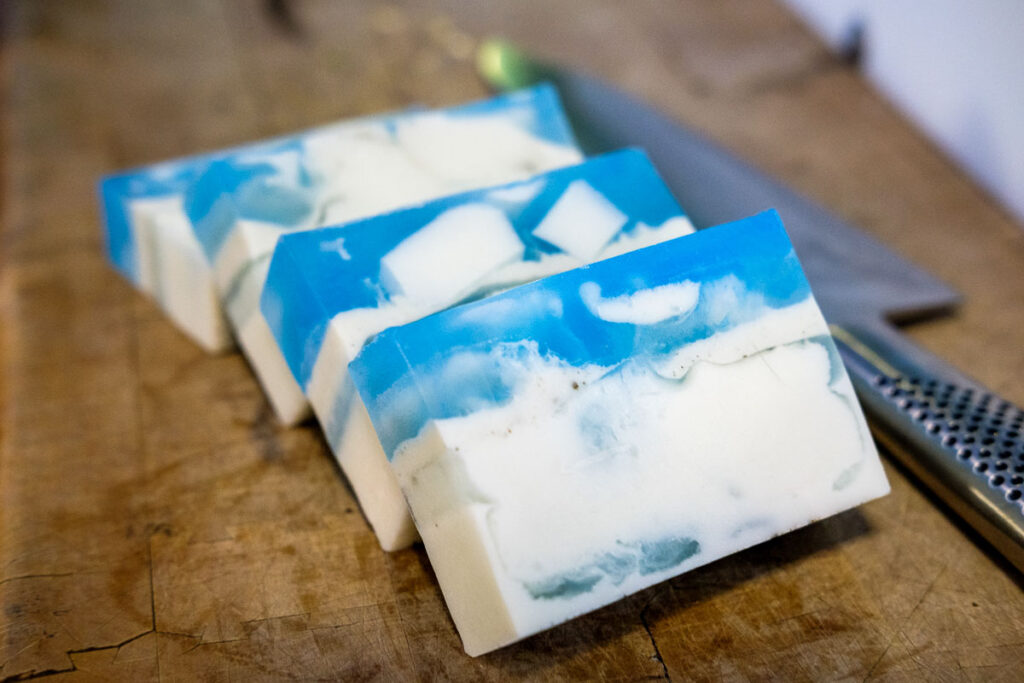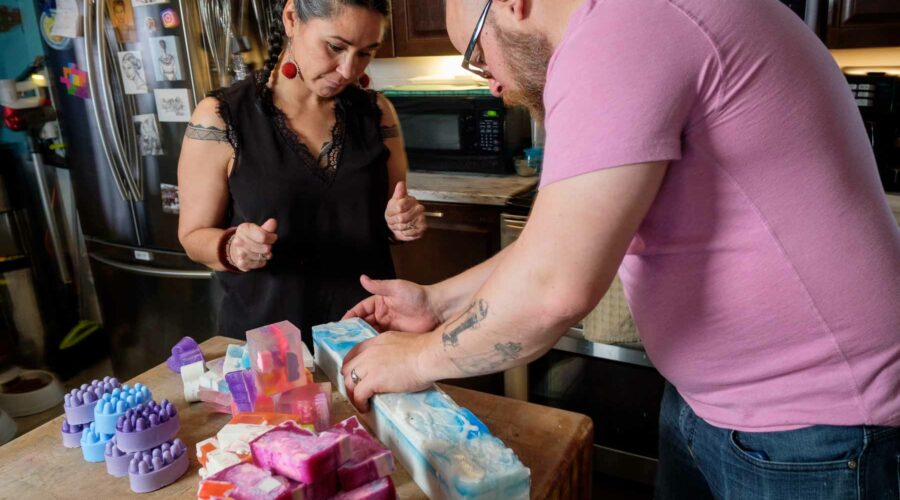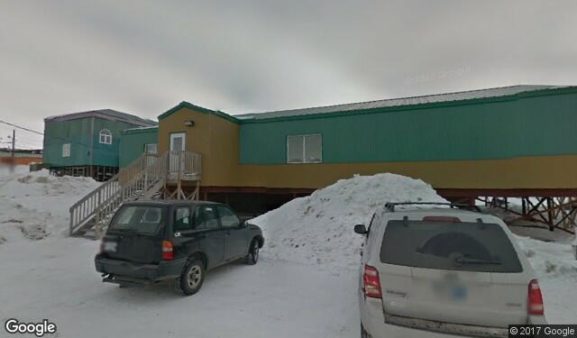The “Magic Juice” of Uasau Soap: How Whale Blubber is Healing Skin and Scars
By Lubna bin Zayyad
Uasau Soap embraces Inuit Qaujimajatuqangit, which is reflected in their sustainably-sourced raw materials, such as bowhead whale oil, lichen, seaweed, kuunga clay and seal fat.

Bernice and Justin Clarke are the husband-wife duo behind this Iqaluit-based small business committed to making soap bars by hand.
Before she started making soap, Bernice was encouraged by her cousin to make homemade body butter after a trip to the local market.
“My friends loved it! They started to tell me that the bumps on their arms were healing [and] their eczema was better, and their nails were stronger. [It] made me think, okay, I think I’m onto something!”
Entrepreneurship was nothing new to Bernice. She started her career selling Mary Kay Cosmetics to friends and family around town. Her experience was so positive, she explains, that it felt natural to branch out and start her own business.
“Mary Kay’s story is to promote women and empower women, and it made women feel good…I like that feeling that I get when I make others feel good, [and] it is aligned with who I was.”
Mary Kay taught her the basics of business. After her first craft fair selling body butter, Bernice realized she had to get a client list started of customers who wanted her products.
“Everybody came, and I said okay if you want to be a regular customer, I’ll take your name [down] because like I said with [my] Mary Kay [experience], it taught me how to take care of customers.”
With the customer experience side in hand, it was time to start exploring a new product line that also addressed some of the skin concerns of her clientele. New products meant locally sourced ingredients in soaps, for example, bowhead whale blubber. Friend Jesse Mike’s mother, Meeka, suggested the ingredient.
“(She) told me that whale blubber is also used to heal skin problems, and she said I think they would go well together, so do you think you can put the whale oil in your soap?
“I thought it was a crazy idea! I wasn’t sold,” Bernice laughs.
Healing through community knowledge

Despite not initially being sold on the idea, combining whale blubber with her handmade soaps ultimately ended up being a fantastic idea that healed not only people’s skin but also the scars of the community.
“I call it magic juice,” says Bernice, referring to the scentless Bowhead whale blubber, “It’s gold. It looks like pure gold. Our business transformed, and we were no longer a natural body care line. [Our products held] cultural knowledge… I was able to take back something that was lost.”
Commercial whalers from imperial countries discovered the bowhead whale as early as the 17th century, but in 1946 they became a protected species. The lack of regulated commercial whaling drastically reduced the bowhead whale populations to near extinction. In Canada, Bowhead whales (arviq) are integral to the Inuit way of life and, in the past, were an essential part of the traditional diet. For Bernice, using the blubber in her soaps helps her practice her culture in small but empowering ways.
Her soaps opened a dialogue amongst the community about traditional medicine and knowledge. She gets teary-eyed as she explains the profound impact these conversations have had on her.
At first, her success made her feel guilty because she felt like she was leaving her community behind.
“I was sitting in my car feeling guilty… [but then] I had to accept that it’s part of healing. I started healing in different ways and seeing [this growth] as a responsibility. So, I started asking how I can be more impactful in small ways?”
Her philanthropic efforts include a scholarship for Inuit high school students and an annual Christmas toy and food drive for low-income families, “That’s the Inuit way of giving.”
“I needed it to be expressive of myself and my culture.”
Bernice explains how she was able to level up her business after being the first cohort to graduate from EntrepreNorth, a project focused on empowering Indigenous and community-based entrepreneurs to build sustainable businesses.
Through the program, Bernice shares how she fully realized her potential and value as a business owner. “It gave me strength in myself as an indigenous person, especially as a woman and a Northern-based small business. They made me see my value in myself and my business.”
For Bernice especially, the value came not only with the products she sells but the story and connection it has to her Inuk culture.
“When I started to name the business, I needed it to be expressive of myself and my culture, [because] I want to mix the two worlds… I want to weave everything together.”
This desire to merge the two worlds is playfully highlighted in Uasau’s name and logo. The name is an Inuk play on the English word ‘wash,’ and it is also a palindrome. Bernice’s friends, artists Celina Kalluk and Becky Qillavaq, created the company’s logo. The image is of a mother with a slight belly, her hair braided the traditional Inuit way, wearing an amauti (mother’s parka) that holds her baby as she leans over a fire.
Her appearance, Bernice says, was a deliberate choice.
“My friend said mothers have a belly so give her a belly, and that’s really powerful to see.”
The lettering reflects the shape of the amauti, which was Celina’s idea. Becky helped with the braids and made the name a palindrome.
While not explicit, the connection between women, family and community are themes that play a prominent role in Bernice’s business. She shares how soapmaking has helped her connect with and heal her child.
“I said here, do what you want, and that was a very powerful feeling to give my child the ability to create. Their soaps started coming out looking so different [to mine]!”
Bernice will trade her finished products for raw ingredients when sourcing certain ingredients.
“Louisa Tukkiapik and I would trade lichen (in exchange for) Peppermint because it was her favorite scent,” she says. Another friend, Inuk Trennert, recently sent some lichen to help make more I Lichen You soap. “[When I need blubber] I will contact a community, and they say they know me, and they’ve already kept some blubber aside for me.”
The power to speak up
Starting a business is hard, not to mention the amount of dedication it takes to grow it in a rural and primarily fly-in community. Despite these challenges, Bernice says she wouldn’t change a thing.
“That was one thing I didn’t expect to happen, the growth that happened within me. My voice got louder. My stance got stronger. I got stronger!”
With the growth of her business, Bernice has had a lot of exposure, including being in the semi-finals for 2021’s Pow Wow Pitch, and is an outspoken advocate of Inuit culture and language.
“I think, especially as women and minority women, it’s so scary to speak up. You don’t believe in yourself, and you’re afraid of what’s going to happen if you do speak up. I’m shaking when I’m [speaking up], but I can’t back down.”



